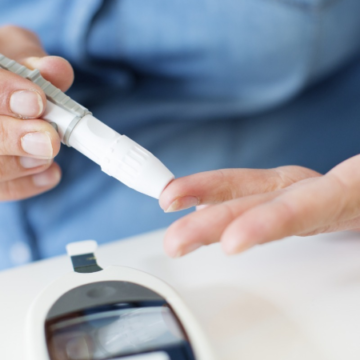
- The Centers for Disease Control and Prevention (CDC) considers diabetes as a chronic health condition that affects how the body turns food into energy.
- The three main types of diabetes include gestational diabetes (diabetes while being pregnant), type 1, and type 2 diabetes.
- There are different signs and symptoms of diabetes and knowing about them helps you detect diabetes early and manage it better.
Diabetes is a condition characterized by high levels of blood sugar. According to the Centers for Disease Control and Prevention (CDC), it is a chronic disease that affects how you choose your diet because it has something to do with how the body converts food into energy.
Type 2 diabetes is the most common type of diabetes, accounting for 90% of all cases, followed by type 1 diabetes and gestational diabetes. Type 2 diabetes is common among adults while Type 1 diabetes occurs mostly in children and adolescents and gestational diabetes is experienced during pregnancy.
Below are some of the warning signs of diabetes. Know more about them and ensure early diabetes detection.
1. Frequent Urination At Night

Increased urination is one of the common signs of diabetes. According to the Mayo Clinic, there is an overproduction of glucose when you have diabetes. As a result, the kidneys need to work overtime to filter and absorb the excess glucose.
2. Excessive Thirst

Excessive thirst, or also termed polydipsia, might be an indication of high glucose levels, according to Diabetes.co.uk. It can be accompanied by sudden or prolonged dryness of the mouth.
3. Unexplained Weight Loss

The Cleveland Clinic explains that when you have diabetes, insulin, which is the hormone that allows the body to use glucose for energy, is not used effectively. The glucose cannot be transported to the cells and ends up building up in the blood.
A the same time, as the glucose does not reach the cells, the body detects it as starvation and reacts by burning fat and muscle quickly to create energy. This rapid energy production results in unexplained weight loss.
4. Increased Hunger

The blood glucose levels remain abnormally high when you have uncontrolled diabetes. As glucose cannot enter the cells due to lack of insulin or insulin resistance, the food that you ate cannot be converted to energy. Without energy, your body craves more for it and stimulates the hunger hormone.
5. Blurry Vision

While UCLA Health lists different reasons why you experience blurry visions, diabetes could be one of them. Blurry vision is another warning sign of diabetes and if not detected early, it can worsen and cause blindness. With diabetes, the small blood vessels in the retina can get damaged and results in a condition called retinopathy.
6. Numbness in the Hands and Feet

Diabetic neuropathy is another complication of diabetes, according to the Mayo Clinic. The nerves in the legs and feet get damaged and pain and numbness can be felt in these parts. Other people may also experience problems with the digestive tract, heart and blood vessels, and urinary system.
7. Fatigue

Diabetes.co.uk shares that having too low or too high blood glucose levels can also result in tiredness, lethargy, and fatigue.
8. Dry Skin

According to the American Academy of Dermatology Association, high blood sugar can also cause the skin to become dry.
9. Slow-Healing Sores

People with diabetes are more prone to getting skin infections caused by bacteria and fungi such as diabetic dermopathy, necrobiosis lipoidica diabeticorum, diabetic blisters, and eruptive xanthomatosis. Skin problems can also be the first sign of diabetes.
10. Recurring Infection

The Association for Professionals In Infection Control and Epidemiology notes that high levels of blood sugar can make the immune system weaker.
People with diabetes can also develop peripheral damage and have lesser blood flow to their extremities. This condition can result in lesser sensation in these body parts, which prevents them from noticing infections early. The high sugar levels can also worsen the condition and allows the spread of bacteria and infections.
The CDC recommends people who experience the above-mentioned symptoms undergo a blood sugar test and ask for a doctor’s advice regarding its result. Early detection and creating a treatment plan can help you manage your diabetes better.
